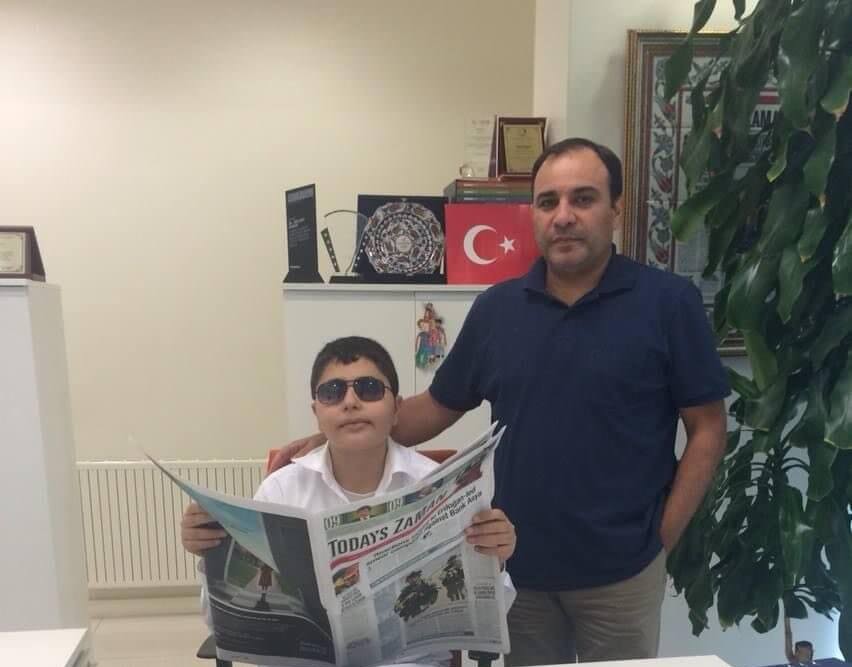Visually impaired Turkish journalist Cüneyt Arat has announced that he was interrogated by the police due to his refusal to recognize a Turkish journalist living in exile in Sweden as a terrorist.
Arat, who had spent two years in jail due to alleged links to the faith-based Gülen movement following a coup attempt in Turkey in 2016, announced on Twitter on Monday that he was questioned by the police due to his remarks about the Gülen movement, journalist Bülent Keneş and President Recep Tayyip Erdoğan.
The Gülen movement is accused of masterminding the coup attempt on July 15, 2016 and is labelled a terrorist organization by the Turkish government. The movement, inspired by the views of Turkish-Islamic scholar Fethullah Gülen, strongly denies any involvement in the failed putsch or any terrorist activity.
Arat was asked about some of his earlier tweets during his interrogation at the Adana Police Department in southern Turkey in which he refused to recognize the Gülen movement and Keneş as terrorists.
Gülen Hareketi, Bülent Keneş ve Recep Erdoğan ile ilgili, Adana İl Emniyet Müdürlüğü Güvenlik Şube Görevlilerine verdiğim ifade. pic.twitter.com/fO8ujx9kHY
— cüneyt arat (@CuneytArat06) June 12, 2023
“AKP [Justice and Development Party] President Recep Tayyip Erdoğan, the Gülen group is not a terrorist organization. No member of the Gülen group is a terrorist. Bülent Keneş is not a terrorist but a journalist. While you are oppressing thousands of disabled people, he is a voice for us,” Arat said in his tweet.
In another tweet, he accused Erdoğan of being a tyrant and liar for suing him on insult charges.
Keneş, the former editor of the now-closed English language Today’s Zaman daily, is among the political dissidents whose extradition Turkey is seeking from Sweden in exchange for approving the country’s bid for membership in NATO. The journalist is the only person President Erdoğan has identified by name among dozens of people Ankara wants extradited.
In a move that angered the Turkish government, Sweden’s Supreme Court in December refused to extradite Keneş to Turkey, saying some of the accusations against Keneş are not crimes in Sweden, which along with the political nature of the case and his refugee status, made extradition impossible.
Keneş is accused by the Turkish government of links to the Gülen movement. Today’s Zaman, a sister newspaper to Turkey’s best-selling newspaper Zaman, was closed down by the government in the aftermath of the coup attempt in addition to dozens of other media organizations due to their links to the movement.
The copies of his statement to the police Arat shared on Twitter show that he did not backtrack and stood behind his tweets, repeating that neither the Gülen movement nor journalist Keneş is a terrorist. He referred to the rulings of the European Court of Human Rights, decisions by some UN bodies and court decisions in countries governed by the rule of law as proof that no member of the Gülen movement has been recognized as a terrorist.
Arat said Keneş welcomed him at his Today’s Zaman newspaper in 2014 and gave him the chance to talk about the problems of the disabled while Erdoğan fired thousands of disabled people from public service as part of a massive purge he launched following the coup attempt under the pretext of anti-coup fight.
He said although Erdoğan once described the disabled as the “children of paradise” and said he loved them, he placed thousands of such people and their families in a difficult situation by dismissing them from public service because these people cannot easily find jobs elsewhere due to their disabilities.
Arat denied that he insulted the president or praised a criminal organization and requested that the investigation into him be dropped.
Keneş, who was outraged by Arat’s ordeal, tweeted, “Look at what the corrupt Islamofascist Erdoğan regime is dealing with… You are deplorable. Shame on you.”
Harami İslamofaşist Erdoğan rejiminin uğraştığı şeye bakın… Acınacak haldesiniz. Yazıklar olsun… https://t.co/oWgLUC0c2v
— Bulent Kenes
(@bkenes) June 12, 2023
Last year, Turkey’s pro-government Sabah daily and state-run TRT Haber news station targeted Keneş by publishing secretly taken photos of him and broadcasting footage of his home in Stockholm.
Keneş, an outspoken critic of the Turkish government, gained international attention after Turkey made his extradition a prerequisite for its approval of Sweden’s NATO membership.
He is among the scores of Turkish journalists who had to flee Turkey following the coup attempt in order to avoid the government crackdown on critical journalists.



